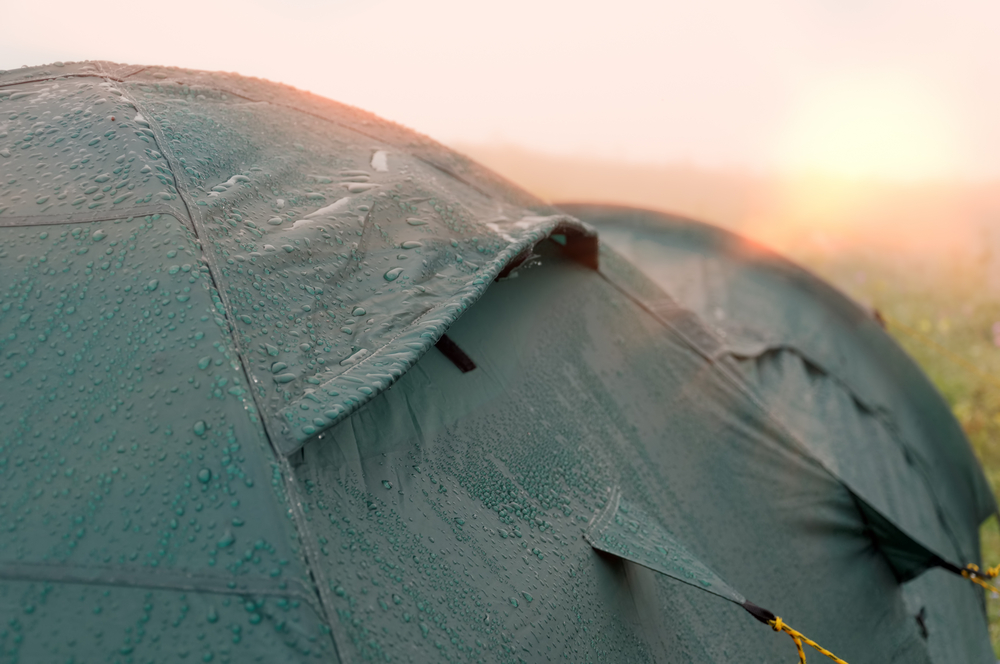Any tent that you buy can have the potential to leak, even if you have spent a large amount of money on your purchase. Though, the last thing that anybody wants is to go on a camping trip and spend the entire trip soaking wet and miserable.
Something that you might have heard about is that touching a tent can make it leak, which is something that we are going to look at in this article There are a few reasons why this could happen, and being aware of the problem can help you to solve it.
If you have noticed that this is the case for your tent, don’t be worried. There are some things that you can do to fix the situation and get your tent working as it should in no time. So, before you panic, be sure to read this article and find out more about why it is happening.
Table of Contents
Does Touching a Tent Make it Leak?
If you touch your tent, it is likely to leak as by doing so, you are breaking the surface tension. Without strict surface tension, the upper layer of water molecules will not be sufficiently binding, which can easily cause a leak.
Something else that could be responsible for this is the hydrostatic head, which is part of the tent’s fiber characteristics that works to keep the water out.
The surface tension will change simply due to your touch, but the hydrostatic head will remain the same, and can still try to prevent water penetration.
Can You Touch the Sides of a Tent?
It is not recommended to touch the sides of your tent as they can become damp in wet weather. Anything that is touching the sides of the tent can cause water to come through the walls.
Whether it is you touching your tent or your luggage, you should try to avoid this at all costs if you don’t want to wake up in a puddle.
What is Hydrostatic Head?
When it comes to synthetic tents, you might have seen the term HH floating around, and this stands for hydrostatic head. This is one of the characteristics that tents will feature to ensure that they are water resistant.
The number next to HH will represent the height of a water column that the fabric will be able to resist. So, if you are camping in the rain the more water that is raining onto your tent, the higher the pressure of the water will be applied to the surface.
At the point where the pressure is maximized, the height of the column can be measured, and this height in millimeters is the hydrostatic head of the fabric.
So, if the tent has a HH of 4000, it will be able to hold a water column that is 5000 mm tall. You will also need to consider other variables, like the seams and zippers of the tent, but the higher the HH value is, the more water resistant the tent will be.
Though, the overall structure of the tent can also play a part in how efficient it is at blocking water.
Why Does a Tent Leak When You Touch It?
More often than not, a tent will start to leak when you touch the sides of it as the surface tension will draw the water to your touch.
When you stop touching the area, this effect will stop, but the water will still be left behind. This will draw condensation from inside the tent if it is humid, which it usually is when it is raining.
This condensation will continue to build until there is a drop of water, and this area can turn into a leak for as long as the humidity remains high.
Surface Tension
Even if you have a tent with a good HH number, touching the tent can still cause a leak to occur, and this is due to surface tension.
Water molecules will feature cohesion forces, which is what allows them to bind together. Touching the tent will disturb this, which is why a water droplet will form in the area.
All of these molecules will interact with each other to form a single mass, and each molecule will attract the other molecules.
The surface tension would usually work to prevent any water from coming into the tent, but disturbing this tension will typically allow water to come through in a specific area.
So, for the best results, you should get a tent with a high HH and avoid breaking the surface tension of the ten where possible.
As well as avoiding touching the tent, you should also avoid leaving your bags against the walls of the tent, as this can have the same effect and end up leaving all your things soaking wet.
